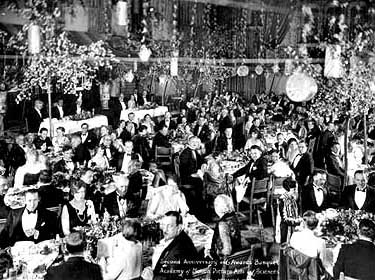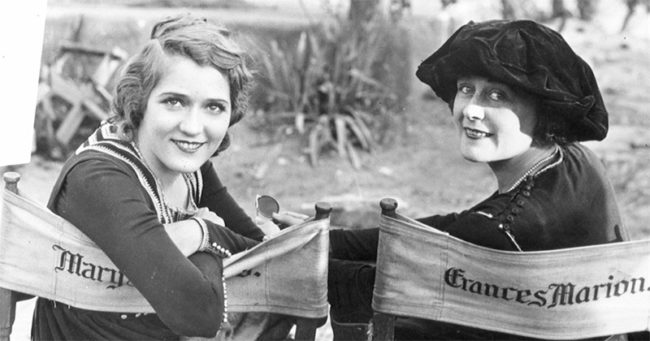From females winners, to minority recognition and technological advancements: here are 11 pioneering Academy Award firsts.

1927: The First Academy Awards
The Academy of Motion Pictures Arts and Sciences was founded in 1927.
It was the brainchild of Louis B. Mayer, the legendary President of MGM Studios, who saw it as a way to promote the industry. There were 36 ‘Foundation Members’ – all personally invited by Mayer – and 230 members of the Academy’s different branches.
The first Academy Awards were held two years later, on May 16 1929, at a lavish banquet (pictured) at the Roosevelt Hotel in Hollywood. Awards in 15 different categories were presented before a crowd of 270 VIPs, all of whom paid $5 for the privilege of attending.
In a move that seems unfathomable today, the winners of the original Oscars were announced before the event in the local press, a practice that was discontinued the following year.

1931: The First Woman to Win in a Non Acting Category
Pioneering screenwriter Frances Marion lead an eventful life.
Born in San Francisco in 1888, she dropped out of school at age 12, and worked an array of jobs; as a photographer’s assistant, a copywriter, a graphic designer, and a journalist. She covered World War I from the front lines, and was the first female reporter to enter Germany, after the Armistice.
Post war, she settled in LA and found her way into the film industry, where she struck almost immediate success. Starting as a writer’s assistant, she became friendly with rising star Mary Pickford, and shortly found herself as Pickford’s preferred choice as screenwriter.
At a time when off-camera women were almost entirely unrecognised in the film industry, Marion developed a hugely successful career, capped by two Academy Awards for Best Adapted Screenplay; for ‘The Big House’ in 1931, and ‘The Champ’ in 1932.
Marion would eventually write more than 300 feature films, and would also author one of the first screenwriting textbooks; ‘How to Write and Sell Film Stories’, in 1937.

1935: The Person to Refuse an Oscar
Dudley Nichols was a New York City journalist, who decided to take his chances in Hollywood.
Moving to Los Angeles in 1929, Nichols quickly found work in the film industry, but was surprised by the conditions screenwriters faced; poorly paid and with no creative control of their work. In 1933, Nichols was one of the co-founders of the Screen Writers Guild, a proto-union that lobbied the studios for better pay and conditions.
Negotiations did not advance very rapidly, the studios were outraged at the formation of the Guild, and members would go on strike in 1935. The same year, Nichols received a big break in his career, when he won the Best Adapted Screenplay Oscar, for Irish crime drama ‘The Informant’.
Standing on his principals, Nichols refused the award. The pay dispute dragged on for several years, eventually being resolved in 1938 (Nichols would subsequently accept his Oscar, once the new pay guidelines were in place).
Nichols had a storied career and would write several all time classic films, including ‘Bringing Up Baby’ and ‘Stagecoach’.

1939: The First Colour Film to Win ‘Best Picture’
Colour films had been around for nearly as long as cinema.
French movie pioneer Georges Melies showed colour movies as early as 1896, a year after the Lumiere Brothers invented the movie camera, although these were black and white films that had been hand painted.Colour film stock was invented in 1918, and colour film photography perfected in the mid 1930’s.
Technicolour, a high quality colour film production technique, was created shortly afterwards, and showcased in two feature films released in 1939; ‘Gone with the Wind’, and ‘The Wizard of Oz.’ Both were subsequently nominated for Best Picture.
‘Gone with the Wind’, a cultural sensation and box office bonanza, was the first colour film to win this category.

1939: The First African-American Oscar Winner
‘Gone with the Wind’ would win 8 Oscars overall, a record at the time, from 13 nominations.
Among these was Best Supporting Actress, awarded to Hattie McDaniel, who became the first African-American Oscar winner in any category. The daughter of two freed slaves, McDaniel had endured a hard upbringing in Kansas, before finding fame in theatre and on the radio.
Despite her own success, and the runaway popularity of ‘Gone with the Wind’, McDaniel was still a victim of the racial segregation prevalent in America at the time. She was unable to attend the film’s premiere in Atlanta, due to the hosting theatre’s refusal to provide a ‘coloured’ dressing room, and she nearly missed the Oscars as well; only the personal intervention of producer David O. Selznick convinced the venue, the Ambassador Hotel, to relax their ‘whites only’ policy for one night.
McDaniel was permitted entry to the ballroom, on the proviso that she sat at the back of the room, out of the spotlight. The hotel was finally forced to admit black patrons, but not until 1959.
McDaniel’s win has attracted debate in more recent times, as objections have been raised regarding her portrayal of a stereotypical character. Regardless of where you land on this aspect, her win remains remarkable; there would not be another black acting nominee until 1949 (Ethel Waters), and not another winner until 1963 (Sidney Poitier).

1950: The First Latino Winner
Jose Ferrer was a pioneering Latino actor, originally from Puerto Rico.
The son of a lawyer, Ferrer enjoyed a privileged upbringing, and completed high school in Switzerland, before attending Princeton University. An enthusiastic performer in amateur dramatics, after graduation Ferrer went to Broadway, where he established himself as a powerful, charismatic actor.
He achieved lasting fame in the title role of a 1947 production of ‘Cyrano de Bergerac’; the play was a smash hit, Ferrer won a Tony for his performance. Reprising the role in a film production in 1950, Ferrer would subsequently win the Academy Award for Best Actor, becoming the first Hispanic performer to win an acting Oscar.
Only a small number have followed in his footsteps; Anthony Quinn (twice), Rita Moreno (‘West Side Story’), Mercedes Reuhl (‘The Fisher King) and Benecio del Toro (‘Traffic).

1953: The First Televised Oscar Ceremony
On March 19, 1953, the Oscars took a major step into the future; they were televised for the first time.
American network NBC carried the 110 minute telecast (brief by today’s standards), and had cameras both at the RKO Pantages Theatre in Hollywood, and their own studio in New York, where east coast nominees could join in.
Bob Hope hosted a ceremony that featured several notable winners. John Ford won his fourth Best Director Oscar for ‘The Quiet Man’, and remains the only person to have won four awards in this category. And in a major upset, favourite ‘High Noon’ was beaten for Best Picture by the circus drama ‘The Greatest Show on Earth’; in subsequent years, often cited as the worst film to have won in this category.

1956: The First ‘Best Foreign Film’
The Academy began recognising Foreign – i.e. non English language – films shortly after World War II.
From 1947 to 1955, they honoured one Foreign Film per year with a ‘Special Achievement’ award. The first recipient was ‘Shoe Shine’, directed by Italian neo-realist master Vittorio Di Sica. It was not until 1956 that Foreign Films earned a full category of their own, with five individual nominees and one winner.
The first winner was another Italian legend; Federico Fellini, for ‘La Strada’. The story of a circus strongman who is an appalling human being, and who treats his devoted wife horrifically, ‘La Strada’ is a powerful human drama that helped establish Fellini’s reputation in the west.
Fellini has won the most Oscar’s in this category, four times, and Italy has produced the most winners, with 14.

1974: The First Woman to Win a ‘Best Picture’ Oscar
It was not until 1974 that a female producer was nominated in the Best Picture category. This was Julia Phillips, who was not only nominated but won, for classic caper flick ‘The Sting’ (along with her husband Michael Phillips, and co-producer Tony Bill, pictured).
Phillips’ Hollywood career was short, but electrifying. She was only 29 when ‘The Sting’ was released, and in the next three years she would produce ‘Taxi Driver’ and ‘Close Encounters of the Third Kind’, both among the most iconic American films of the 1970s.
She was close friends with some of the leading lights of the ‘New Hollywood’ movement – Martin Scorsese, Robert De Niro and Warren Beatty among them – and was one of its foremost female voices. She also developed a raging cocaine habit, that damaged her health and career, and lead to several stints in rehab.
Eventually unable to find work as a producer, in the 1990s she wrote a tell-all memoir called ‘You’ll Never Eat Lunch in this Town Again,’ where she dished a lifetime’s worth of dirt about her former friends and acquaintances.

1977: The First Woman Nominated for ‘Best Director’
Also tackling the Oscar’s glass ceiling was Lina Wertmuller, an Italian auteur who became the first woman nominated for Best Director, in 1977.
Wertmuller had taken an atypical path to film making. Studying fine arts in Rome in the 1940s, she was originally drawn to the theatre, where she worked as an actor and set designer. Later, she would join a popular travelling puppet troupe, where she befriended several actors with film connections. This lead her to a role as an assistant on the Fellini classic ‘8 1/2’: the acclaimed director would subsequently mentor Wertmuller, and produce her first feature film, ‘The Lizards’, in 1963.
Italian critics were dismissive of Wertmuller, but she found success in America. Her movies were flamboyant and distinctive, often featuring low rent criminals, and brash sexuality; her depiction of women – often theatrically heightened and drawn to deadbeat mean – stirred controversy in feminist circles.
Wertmuller was nominated for ‘Seven Beauties’, an episodic film about an Italian pimp who ends up in a Nazi concentration camp. She was beaten by John G. Avildsen, the director of ‘Rocky’. It would be 32 years before another female director would be nominated.

2001: The First ‘Best Animated Film’ Winner
Based on a popular children’s book, ‘Shrek’ underwent a torturous journey to the big screen.
Production started in 1991, and it would take ten full years for the film to be realised, during which time a number of directors, actors, and producers came and went. Chris Farley was the original choice to play Shrek, and had finished his voice work when he died of a drug overdose in 1997. The studio subsequently decided it would be too upsetting to use this performance. The role was re-cast the with Mike Myers, who then insisted on a complete re-write.
The finished movie was a box office sensation, grossing $260 million, and spawning a popular franchise. It won the inaugural Best Animated feature Oscar in 2001, beating a field containing only two other films; ‘Monsters Inc’, and ‘Jimmy Neutron: Boy Genius.’
Prior to this, animated films had either had to take their chances in the Best Picture category (a small number had been nominated), or had occasionally been recognised by a Special Achievement award.
Other Notable Firsts
1927: The First Best Picture Winner – ‘Wings’
1932: The First Acting Tie – Wallace Beery and Frederic March tie for Best Actor
1957: The First Asian Oscar winner – Miyoshi Umeki, Best Supporting Actress for ‘Sayonara’
1977: The First ‘Best Visual Effects’ Winner – ‘Star Wars’ (films had previously been given a ‘Special Achievement Award’ for VFX)
1994: The First Woman to Host the Oscars Solo: Whoopi Goldberg (also the first black host)
2009: The First Woman to Win Best Director – Kathryn Bigelow for ‘The Hurt Locker’
2010: The First Woman to Win Best Sound – Lora Hirschberg for ‘Inception’ (Also the only woman to win this category, to date)

